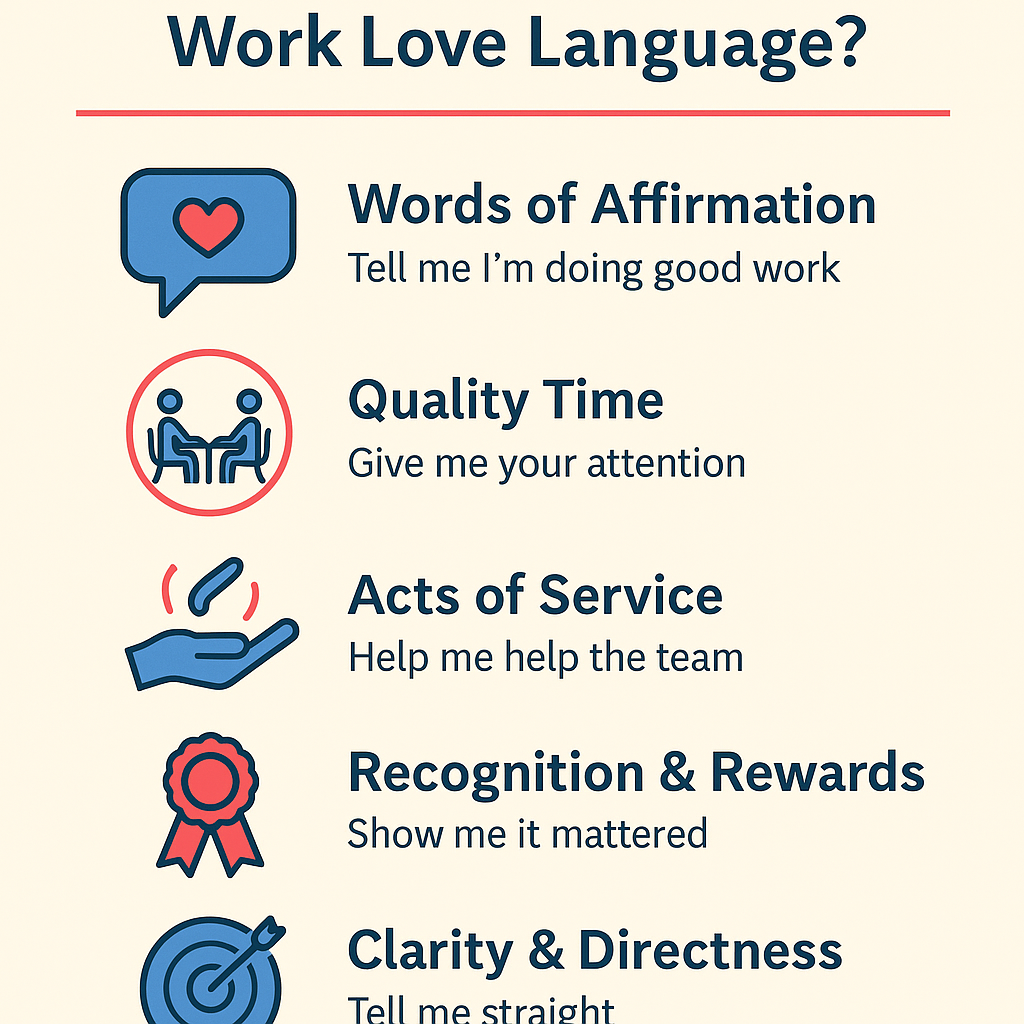What Is Your Team’s Work Love Language?

Recently, Phillip, our CEO here at SaverSystems, did something refreshingly bold:
He sent out a survey to his leadership team asking for feedback on his own management style - what was working, what wasn’t, and how he could grow.
One set of questions in particular caught my attention:
“How do you prefer to receive feedback?”
And it got me thinking…
We all have different preferences. Some want it straight. Some want it soft. Some want it in writing. Others need face-to-face.
It reminded me of a concept from relationship psychology: The Five Love Languages.
If you want stronger personal relationships, understanding someone’s love language is critical.
If you want to be a better leader?
You need to understand your team’s work love languages.
Because how you deliver the message matters just as much - if not more - than the message itself.
Why Feedback Delivery Matters
You might give someone a compliment or helpful suggestion, but if it’s in the wrong format or tone, it can fall flat - or worse, backfire.
Some people love a public shoutout. Others would rather crawl under a desk than be called out - even positively - in front of a group.
Miss the mark on how someone likes to receive feedback, and your message may never even land.
But when you speak their work love language? You build trust, boost morale, and foster growth.
So... What Are Work Love Languages?
Here’s how your team might prefer to receive feedback and appreciation - and the best vehicle for each.
1. Words of Affirmation: “Tell Me I’m Doing Good Work”
- They crave: Encouragement, praise, and validation.
- Ideal vehicles: In-person, email, handwritten notes, Slack shoutouts, even meetings.
- Use when: They go above and beyond, crush a project, or show strong effort.
- Warning: They may quietly wonder if they’re doing a good job if they don’t hear it.
Leadership tip: Just like love, regular affirmation fuels confidence. Make “catching people doing things right” a habit.
2. Quality Time: “Give Me Your Attention”
- They crave: Focused, uninterrupted time with you.
- Ideal vehicles: 1:1 meetings, walking check-ins, team brainstorms, impromptu Zooms.
- Use when: Coaching, problem-solving, or aligning on goals.
- Warning: Canceling or constantly rescheduling 1:1s might feel like abandonment.
Leadership tip: Think of your time as your love language currency. Spend it wisely—and consistently.
3. Acts of Service: “Help Me Help the Team”
- They crave: Support, action, and problem-solving.
- Ideal vehicles: Quick “I’ve got your back” messages, help removing roadblocks, offering resources.
- Use when: They’re stretched thin, overwhelmed, or stepping into new territory.
- Warning: Words without follow-through can lead to burnout or resentment.
Leadership tip: Don’t just say, “Let me know if you need anything.” Show up. Pitch in. Fix something.
4. Recognition & Rewards: “Show Me It Mattered”
- They crave: Tangible signs of appreciation—bonuses are great, but small tokens go a long way.
- Ideal vehicles: Gift cards, surprise lunches, team shoutouts, milestone celebrations.
- Use when: They reach big goals, save the day, or hit an anniversary.
- Warning: Silence after success can feel like indifference.
Leadership tip: Keep a low-cost reward stash on hand—and use it generously.
5. Clarity & Directness: “Tell Me Straight”
- They crave: Honest, actionable feedback without sugarcoating.
- Ideal vehicles: In-person chats, Zoom calls, or even direct Slack messages (if preferred).
- Use when: There's an opportunity for growth or redirection.
- Warning: Dancing around issues or vague advice = confusion or frustration.
Leadership tip: Directness isn’t cruelty - it’s clarity. Pair it with care, and you’ll earn major respect.
Discovering Your Team’s Language
Want to lead better? Start by learning each team member’s preferred “language.” You don’t need a corporate psychologist—just curiosity and a good question.
Try this:
- “How do you like to receive recognition?”
- “Do you prefer direct or soft feedback?”
- “What makes you feel most appreciated at work?”
Or go full nerd: make a fun quiz or have each person fill out a quick “User Manual” with their preferences.
Then tailor your feedback to what actually fuels them.
Feedback Is a Love Language
Thanks to Phillip’s survey, I was reminded that great leadership isn’t just about what you say - it’s about how you say it.
So, ask yourself:
- Do you know your team’s work love languages?
- Are you speaking them fluently?
- Are you delivering feedback that lands?
Because when you match your message to someone’s feedback style, you don’t just improve performance…
You build loyalty, trust, and a workplace people want to be a part of.
And that? That’s love.


